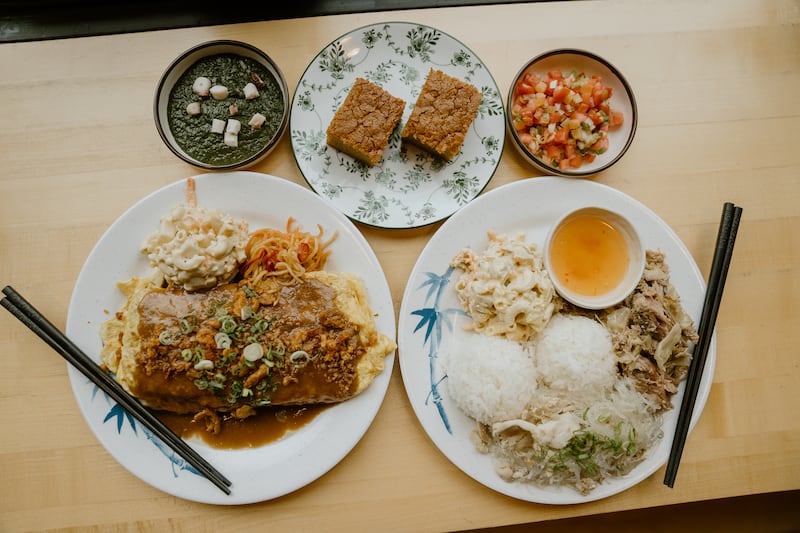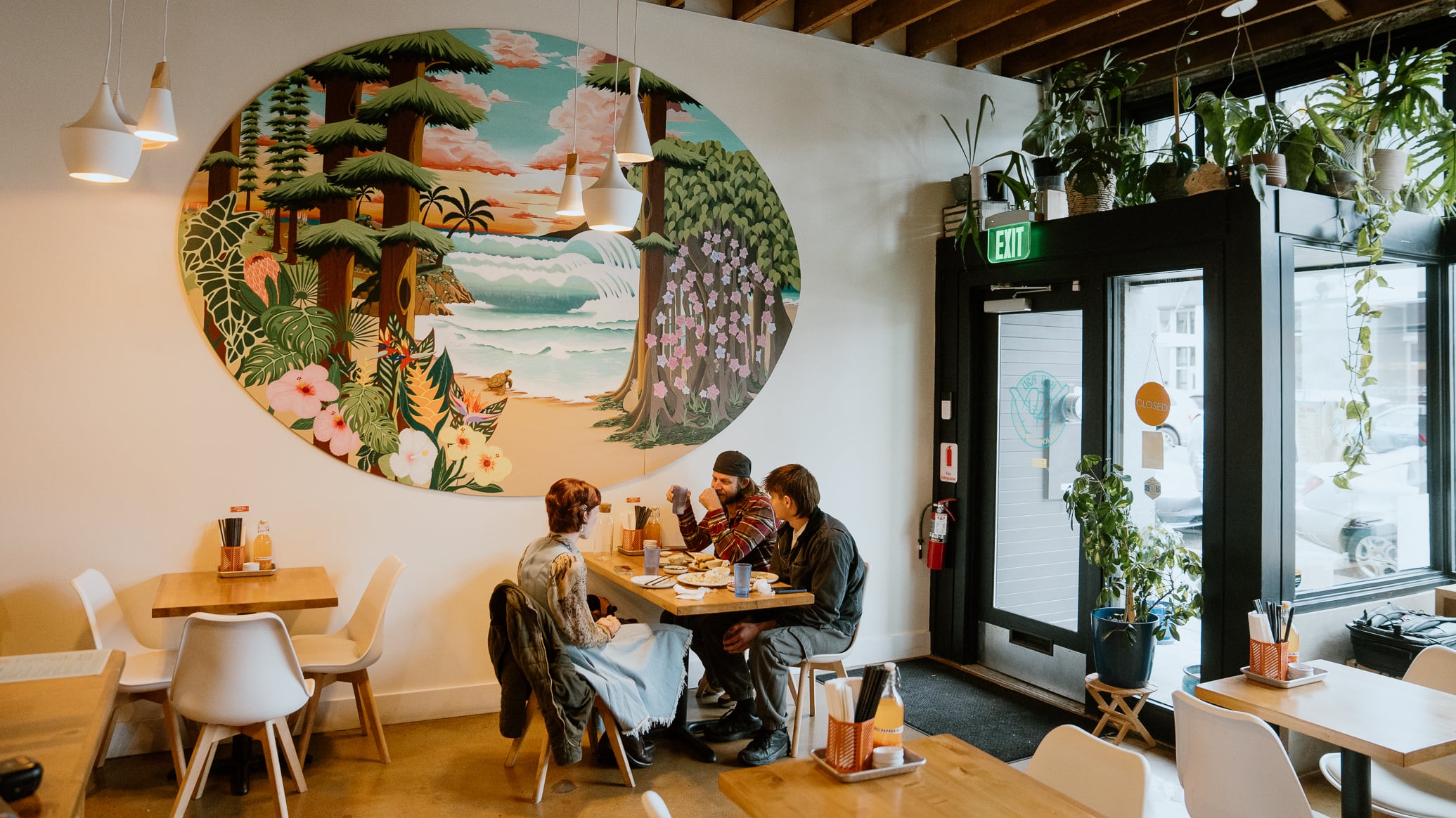The elevated Hawaiian pop-up Kau Kau PDX made the jump to brick-and-mortar back in March, settling into a former shawarma shop on Northeast Alberta Street. Owners Brandon and Tracee Hirahara set out to change diners’ perceptions of what Hawaiian cuisine is. Barbecue, mac salad, Spam and pineapple might most readily leap to mind, but the Hiraharas know the islands’ culture runs deeper than that. They bring in pan-Asian influence and ingredients, changing almost half of Kau Kau’s menu each Thursday to exercise diners’ imaginations. Not every item is a winner, but standards like the hamburger-and-egg classic loco moco ($22) and panko-fried chicken katsu with curry ($18) are assured yet unique enough to make the restaurant stand out on its kitchen’s talents.
The katsu curry, for example, is served with fukujinzuke, a Japanese fermented relish side dish comparable to kimchi. Fukujinzuke is made commonly from vegetables such as daikon, eggplant, lotus root and cucumber, and while servings are typically small, it was so good that I wish I had ordered more. Kau Kau’s fukujinzuke has more of an umami pop than spicy kimchi, plus an oil-slick texture and satisfying crunch. The chicken thigh slices are generously breaded and plenty juicy, with a sliced veggie-rich brown curry poured over rice and served with a side of mac salad.
Portland Monthly’s review of Kau Kau from May expands on the complex legacy of mac salad to Hawaiian cuisine. Mac salad was served in hotels across the islands, just like Spam was brought over by military occupation. Native Hawaiian culture has been violently suppressed and subjugated for over a century, only recently allowed to be practiced and studied on its own terms. The Hawaiian language, for instance, was banned in public schools for nearly 100 years between the kingdom’s overthrow in 1893 and the reintroduction of language immersion programs in 1987 after the ban was lifted the prior year.
Visiting the Hawaiian Islands is a privilege that some people might never experience, but local residents don’t feel as if visitors act like it is, especially when natives get priced out by rich mainlanders or displaced by disasters like the Lahaina fires of 2023. Nobody has to like one specific dish or drink that Kau Kau serves, but the respect that staff show for Hawaiian culture, and model for visitors, should be commended.

That said, how well specials work at Kau Kau can be a matter of personal preference. The menu feels successfully executed for what the kitchen sets out to make, but some items worked better than others while all demonstrated thoughtfulness. We ordered two specials and a curious-looking menu mainstay: pastele stew ($18), omelet-wrapped chicken adobo fried rice ($18), and meat jun ($19). We were wrong on two of three counts on what to expect, to varying effect.
We both expected a watery soup when we read “stew,” but thankfully instead got a hearty, ingredient-heavy dark brown gravy on a rice bed served with side scoops of rice and mac salad. Pastele is a common meal for Hawaiian plantation workers, with origins tracing back to Puerto Rico. Loaded with braised pork collar, achiote powder, black olives, peppers, green banana, tomato and cilantro, the pastele stew was sumptuously seasoned and good to the last drop as our unanimous favorite. The only improvement we could think to ask for would be to include another side instead of a rice scoop, as the rice bed offered white rice aplenty.
My only gripe with the meat jun and the omelet-wrapped fried rice is that I’m just personally not a huge fan of the scrambled egg’s spongy texture. Meat jun should be eaten in the restaurant instead of ordered to go since the fried egg coating might be soft by the time you get home, succulent though the beef cuts be. I wanted something hard-crispy like Mongolian beef, but this just wasn’t the case.
Likewise, though the omelet-wrapped fried rice is loaded with tasty ingredients like crispy chicken skin, veggies, and a generous dollop of adobo-enoki gravy and a side of atchara (a pickled green papaya-forward appetizer)—and while I appreciated the imaginatively fun take on introducing egg into fried rice—I was hoping for an imaginary fried cheese-type crunch that wasn’t there. But that’s nobody’s expectation but my own. The dish was successful on its own merits, and I won’t stand in the way of anyone who craves more egg in their fried rice while it’s still on the specials menu.
The drinks menu, on the other hand, is hit or miss. The seasonal peach margarita ($14) was the right blend of late summer peach flavor and appropriately loaded with tequila reposado, triple sec and lime, served with a grilled peach garnish and a li hing mui rim, the latter accent being a popular Hawaiian snack made from dried, salted plums. It was a proper balance of flavors, booze and ice. The Lilikoi ($14), on the other hand, was immediately too tart before the chile pepper–infused heat kicked in. I enjoy passion fruit and mango juice (learning about POG juice late in life was a game changer), but something seemed off about this particular drink from the regular menu.
The Hiraharas and their staff have plenty of ideas cooking, based on how unique just one week’s visit appeared. Last Thursday’s street takeover is over for the season, but there are plenty of spots luring you to the Alberta Arts District if that’s not your neighborhood. Make sure Kau Kau is on your list of spots to spend island time unwinding with lunch or dinner. The dining room can’t hold too many people with six small tables, a window counter, and small sidewalk space, but Kau Kau’s Hawaiian hospitality will make you feel welcome all the same.
TRY IT: Kau Kau PDX, 2026 NE Alberta St., 503-970-1577, kaukaupdx.com. 11 am–9 pm Thursday–Tuesday.

